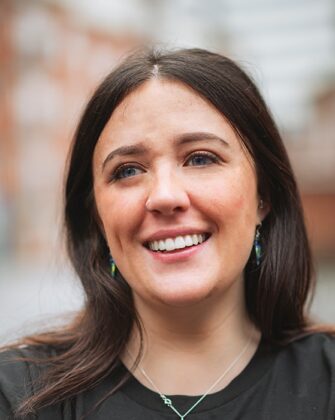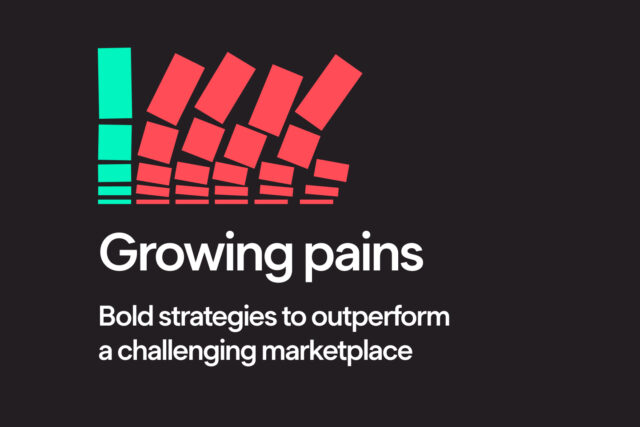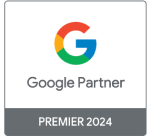From 26th-27th April, some of the Hallam team were fortunate enough to attend the Spring 2024 instalment of BrightonSEO. Now we’re (just about) recovered, these are just some of our team’s favourite talks and key learnings from the UK’s largest search marketing conference.
Talk: Bye SEO strategy, hi organic strategy: how EEAT is a revolution for the industry – Carmen Dominguez
“Of course, we could not do a BrightonSEO wrap-up without mentioning the brilliant talk by Carmen, our Head of Organic. With a focus on Google’s EEAT update, Carmen outlined why it is no longer viable to have siloed content and SEO strategies; for success, brands must think more holistically.
Semantics, technical SEO, link building, user experience (UX), and social media integration are all integral aspects of a unified strategy. They contribute to establishing trust with your users and demonstrating your expertise to Google Quality Raters. Despite the industry’s tendency to prioritise short-term gains such as keyword rankings, Google continually challenges this mindset. Embracing an organic strategy is essential for maintaining a long-term advantage over Google’s evolving algorithms. By focusing on organic tactics, businesses can consistently stay ahead of Google’s ever-changing landscape and establish enduring credibility and relevance in the digital sphere.”
Maddie Hammond, Senior Marketing Executive
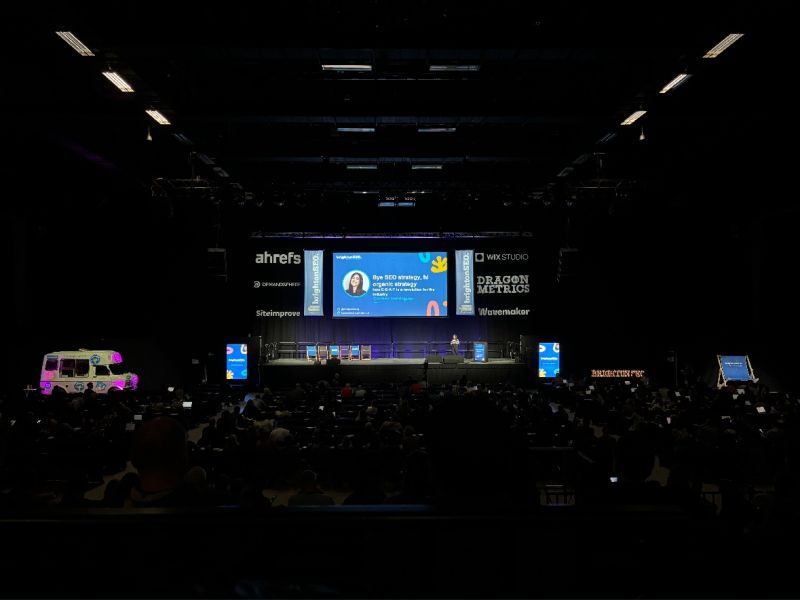
Talk: How to write THE perfect SEO ticket for your devs – Gus Pelogia
“Gus Pelogia, Senior SEO Product Manager at Indeed, emphasised the importance of utilising a Product Requirement Document (PRD) in strategies. For Pelogia, a PRD serves as both a persuasive tool to secure buy-in and resources from sceptics and a means to clearly define the what and why behind actions.
Key components of a comprehensive PRD included setting the background to provide context, outlining the business opportunity, defining the Minimum Viable Product (MVP), addressing technical debt, posing open questions for stakeholder discussion, and establishing rollout dates and measurement goals.
In addition, Pelogia suggested incorporating team bonding activities to foster personal connections, allocating a triage day for approved tickets, and regularly reporting the impact on business goals to ensure a well-rounded and effective system. By embracing these practices, teams could streamline their processes and drive meaningful results.”
Anna Murphy, Head of Marketing
Talk: How videos can elevate your Google rankings and improve your EEAT – Benjamin Szturmaj
“Did you realise that videos play a significant role in SEO, as Google evaluates spoken content to determine rankings? This revelation was the highlight of Benjamin Szturmaj’s presentation at Brighton SEO, where he discussed how videos can boost Google rankings and enhance EEAT.
As a Digital PR Specialist and a tech-savvy Gen Zer, Szturmaj’s insights have inspired me to explore beyond conventional linking strategies, particularly considering the escalating popularity of online videos; recent data indicates that 68% of UK adults watch them daily.
Szturmaj emphasised that creativity often lies beyond the confines of typical search intent tools. Sometimes, the most effective ideas stem from simplicity: Szturmaj’s example of a video detailing navigating from the airport to a car rental service in Orlando had garnered 10k views. Interestingly, Google prioritises viewer engagement over video quality, offering compelling motivation for venturing into vlogging.”
Dana Raer, Digital PR Specialist
Talk: How to categorise keywords with Power BI and ChatGPT – Christopher Hofman Laursen
“As a Technical SEO Specialist, I don’t tend to work too much with keyword research on a daily basis but I’m always looking for ways to streamline SEO processes with AI. Christopher Hofman Laursen’s talk on keyword clustering was just the ticket.
Laursen presented a newly refined process he calls ‘category keyword-isation’. This method is meticulously structured to prevent ChatGPT from misinterpreting information by offering business context, conducting thorough testing, and acknowledging the limitations of ChatGPT while providing effective workarounds. An integral component of this process involves leveraging ChatGPT to brief Claude 3 for keyword categorization, followed by utilising Power BI for comprehensive clustering.
His presentation was enlightening, and I admired his innovative strategy in maximising the potential of each tool.”
Sophie Tanner, Technical SEO Specialist
Talk: Build relevant content by researching your audience on all organic channels – Ray Saddiq
“Many marketers – including myself – have been wondering if Google is being replaced in the search customer journey. This question was at the heart of Ray Saddiq’s talk. The answer? No, Google is not being replaced, but the search journey is evolving and expanding.
As Content Manager at Hallam, staying atop audience engagement trends and how search is changing is crucial to my role. Saddiq has inspired me to explore social channels for inspiration; each platform offers a unique language that our audience speaks. Diversifying our platforms beyond Google is essential for maintaining relevance in this ever-changing landscape.
Saddiq emphasises starting audience analysis by taking breaks from data and crafting detailed buyer personas by utilising seed keywords from socials such as TikTok and leveraging platforms like Reddit for language insights.
By embracing social media to inform our content strategy, even when search volume is low, it ensures that we’re always speaking the language of our audience. Let’s continue creating content that not only informs but resonates and engages.”
Sabrina La Monica – Content Manager
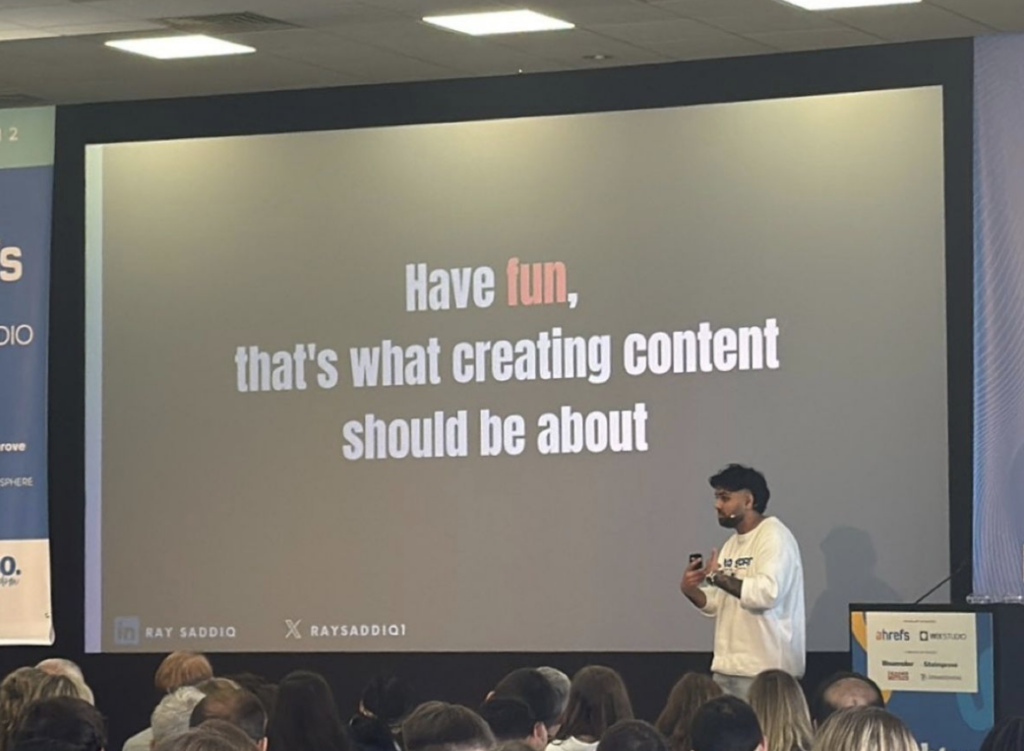
Talk: Selling UP: quadruple your link budget by speaking “CMO” – James Wirth
“James Wirth’s talk delved into the ways we can boost budgets from CMOs for link building. He emphasised the importance of speaking in terms of ROI by calculating revenue divided by cost and multiplying by 100.
Wirth highlighted the importance of tracking conversion values for measuring average order value per link, something which would be far easier to keep track of if we build strong building alliances with paid teams who have the data. Leveraging results from past campaigns to forecast outcomes for new ones is a proven approach to fall back on if, for whatever reason, you don’t have projected cost and revenue numbers available.
To keep CMOS interested, he advocated for beginning presentations with key insights, incorporating visual aids, and showcasing the growth metrics you will use to track projected outcomes effectively.”
Megan McVeigh, Digital PR Specialist
Got a project in mind?
We work with companies of all sizes and our clients include many non-profits, charities and start-ups. Get in touch here

